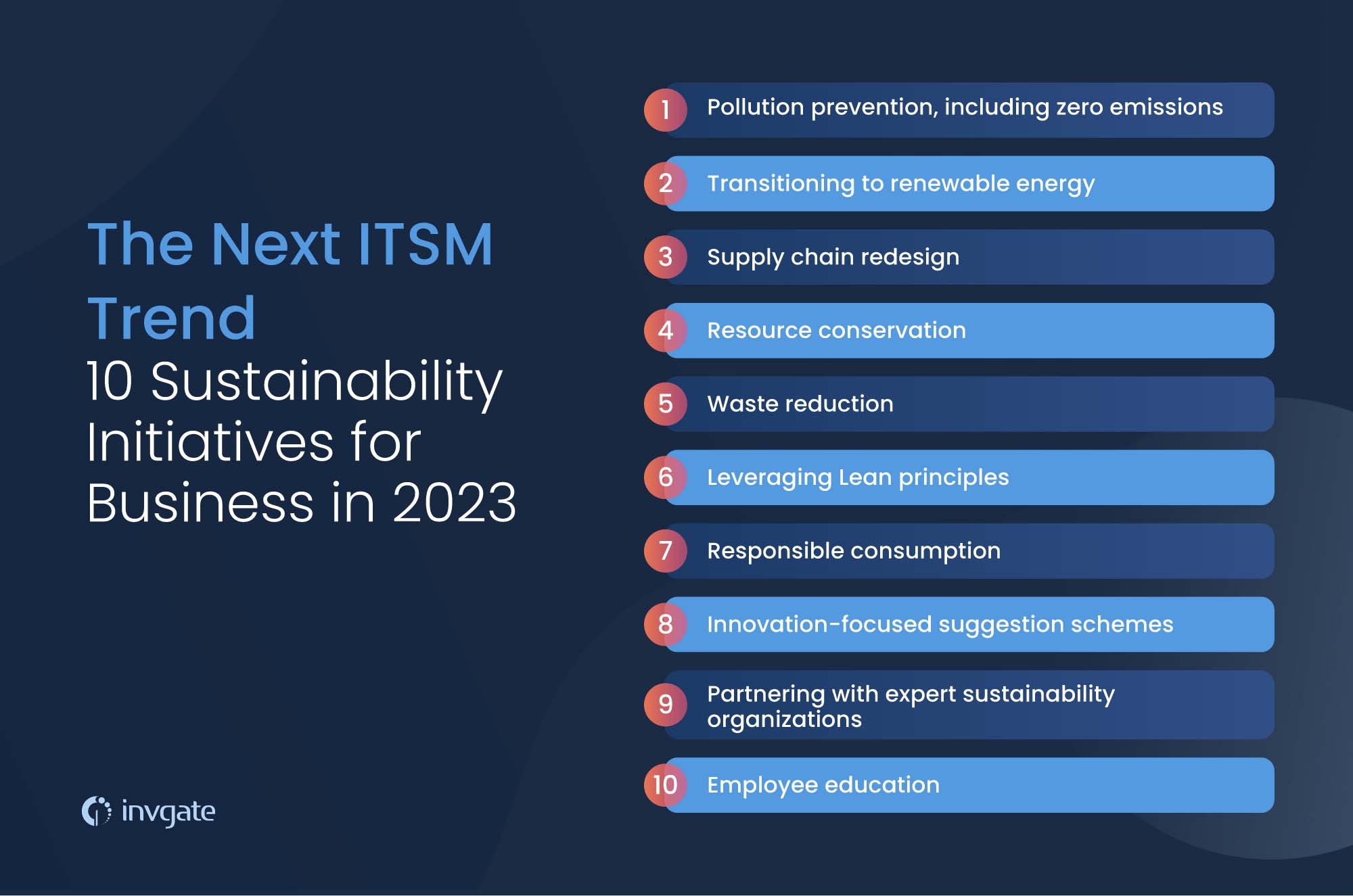Regardless if you work for a large enterprise or a small organization, sustainability is an ITSM trend that you need to be aware of. There are plenty of sustainability initiatives for businesses that have been flourishing for quite some time now, so it’s time to catch up.
But first of all, you might be wondering how is this important to you in an IT service management (ITSM) role. And that would be a valid question. Of course, sustainability is bigger than the ITSM or IT space. It’s a corporate priority and area of focus. And that’s the reason for its relevance.
Its prioritization transformed business sustainability into a concern for all areas of the company since it needs the compromise of the organization as a whole. And that’s where you come in. Not only does your IT organization need to be aware of corporate sustainability strategies and initiatives, but IT and your ITSM operations also need to actively contribute to the corporate strategies and their success.
But don’t worry; we’re here to help. We’ll take a look at what business sustainability is, and then we’ll share ten examples of sustainability initiatives that your organization might be investing in. Some of them you can implement them on your team directly, and for others you might provide the data to make them happen.
Let’s begin!
What is sustainability in business?
Sustainability is another business trend with multiple definitions shared online and via other mediums. One example is the definition shared in the 2021 AXELOS “ITIL 4: Sustainability in Digital and IT” publication:
“A business approach focused on creating long-term value for society and other stakeholders, by addressing the risks and opportunities associated with economic, environmental, and social developments.”
Here, it’s important to appreciate that sustainability is “a business approach,” not just an ITSM trend or a throwback to green initiatives. Instead, it’s a corporate-level focus on “the right thing to do” with a collective drive by sustainable businesses to change their operations – and the world – for the better. Business sustainability initiatives and sustainability programs can focus on a variety of issues, including:
- Climate change action
- Clean energy
- Water cleanliness
- Economic growth
- Species extinction
- Poverty and hunger
- Health and education
For example, the United Nations’ sustainable development goals include “poverty, inequality, climate change, environmental degradation, peace, and justice.”
Sustainability might go by a different name in your organization, with corporate social responsibility (CSR) and environmental, social, and governance (ESG) both popular alternatives. However, most organizations already have some form of sustainability focus, with a 2022 AXELOS sustainability survey finding 87% of organizations having sustainability represented in at least one of their corporate strategies, priorities, and metrics.
Why is sustainability important in ITSM?
While many people might see corporate sustainability strategies and initiatives as the “right thing to do,” sustainability offers corporate bottom-line benefits, too. This includes the improved public perceptions of organizations and their brands that drive sales and thus improve corporate financial results.
The aforementioned AXELOS sustainability survey asked, “Do you think your organization’s sustainability investments will aid its financial bottom line?” As shown below, sustainability is regarded as financially beneficial:
- 44% of respondents said, “Yes.”
- 7% of respondents said, “No.”
- 39% of respondents said, “Don’t know.”
- 10% of respondents said, “There are no sustainability investments yet.”
When the AXELOS survey data is adjusted to consider just the “yes” and “no” responses, 86% of respondents think sustainability investments will aid their organization’s financial bottom line.
The importance of sustainability to ITSM is, therefore, two-fold. First, in helping the organization to deliver against its sustainability strategies. Second, doing what it can to optimize the sustainability position of IT operations.
10 sustainability initiatives for business in 2023
Various sustainability issues and initiatives could be relevant to your organization. Therefore, it must select the right “sustainability initiatives for business” related to its own circumstances and needs. An example is the Toyota Earth Charter which outlines the many areas where the organization is focused on sustainability.

Sustainability initiative #1: pollution prevention, including zero emissions
This is one of the most high-profile sustainable practices initiatives adopted by organizations. It involves modifying business operations to create less pollution or carbon emissions. It includes using non-toxic (or less-toxic) substances and reusing materials where possible, in addition to how business operations might pollute the environment.
For example, the Alliance for Water Stewardship advocates water stewardship, where: “Good water stewards understand their own water use, catchment context, and shared concerns in terms of water governance; water balance; water quality; important water-related areas; water, sanitation, and hygiene, and then engage in meaningful individual and collective actions that benefit people, the economy and nature.” In terms of emission reduction, Google states that it has been “carbon neutral” since 2007.
The Environmental Protection Agency created a Waste Reduction Model (WARM) in the US. This model gives sustainable businesses high-level estimates of potential greenhouse gas emissions reductions, energy efficiency savings, and economic impacts from several different waste management practices.
Sustainability initiative #2: transitioning to renewable energy
While the transition to renewable energy can be considered part of sustainability initiative #1 in terms of pollution and emission reduction, it can also be regarded as a separate sustainability initiative through the use of alternative energy – i.e. non-fossil-fuel-based energy sources such as solar power, wind power, wave power, hydropower, geothermal power, biomass power, and nuclear power.
For example, all Apple retail stores, offices, and data centers have been 100% running on renewable energy since 2018. And each year, Google’s data centers and other operations use 735,000,000 kWh of green energy.
Sustainability initiative #3: supply chain redesign
This sustainability initiative is essential for any organization looking to deliver against its sustainable practice ambitions. After all, a sustainable business can’t truly consider itself sustainability-focused without addressing it, especially if engaging with suppliers without a similar focus and credentials.
An example of an organization mandating how suppliers need to meet sustainability requirements is the Toyota Supplier Sustainability Guidance which includes a section on the environmental impact “obligations”:
- Environmental management system
- Reduction of greenhouse gas emissions
- Reduction of impact on the water environment
- Contribution to establishing a recycling-based society and systems
- Management of chemical substances
- Establishment of a society in harmony with nature
Sustainability initiative #4: resource conservation
This sustainability initiative involves changing business operations for the more efficient use of resources. This focus doesn’t always apply to business operations and can include smaller sustainability changes that all contribute to the corporate sustainability effort by conserving resources. For example, home-based working policies and video calls (to minimize travel), carpooling schemes, water-efficient sinks and toilets, light bulb energy efficiency, minimizing paper use, and automated shut-off systems to avoid power wastage.
This sustainability initiative is closely tied in with sustainability initiative #5 (waste reduction) and sustainability initiative #7 (responsible consumption).
Sustainability initiative #5: waste reduction
The US EPA uses the term “waste minimization” to refer to “the use of source reduction and/or environmentally sound recycling methods prior to energy recovery, treatment, or disposal of wastes. Waste minimization does not include waste treatment, that is, any process designed to change the physical, chemical, or biological composition of waste streams.”
This differs from source reduction (or pollution prevention) since the latter focuses on reducing or eliminating the generation of waste at the source, meaning reducing the use of hazardous materials in production processes. Meanwhile, recycling “includes the reuse or recovery of in-process materials or materials generated as by-products that can be processed further on-site or sent offsite to reclaim value.” So, it avoids creating waste in the first time.
A similar sustainability initiative is “zero waste to landfill (ZWTL),” where an organization plans to eliminate all waste sent to landfill. ZWTL is often an element of a zero-waste strategy. A good example of ZWTL's success is Unilever which claimed zero-waste-to-landfill certification in 2016 by eliminating landfill waste across 600 sites in 70 countries.
Sustainability initiative #6: leveraging Lean principles
The principles behind the Lean manufacturing approach can be used elsewhere within a business (you’ve probably already heard of the concept of “Lean IT”). The approach aims to minimize waste without compromising productivity.
With the traditional Lean manufacturing approach, waste can relate to:
- Excess processing
- Overproduction
- Defects
- Avoidable delays and waiting
- Excess inventory holding
- Unnecessary movement (in logistical terms)
- Underutilized people
From a sustainability perspective, the reduction of excess processing effort and defects, in particular, can substantially impact environmental sustainability.
A good example of Lean principles in action is General Motors. It used Lean Supply Chain Development to work with suppliers to eliminate a painting process step that eliminated 7 tons of volatile organic compound (VOC) emissions per year, reduced hazardous wastes, and had positive transportation-related impacts.
Sustainability initiative #7: responsible consumption
Responsible consumption means using resources efficiently. Importantly, though, it applies to everyone – the organization, its employees, suppliers, retail partners, and customers.
In many ways, it overlaps with other sustainability initiatives, such as:
- Minimizing electricity consumption in buildings, for example, in lighting terms
- Encouraging carpooling or using lower emission forms of transport
- Optimizing logistics to reduce fuel consumption
- Minimizing product packaging
This initiative not only applies to employees but can also be customer-facing. For instance, Apple’s sustainability strategy brings customers into its recycling process. Encouraging them to trade in their old Apple devices, so that Apple can reuse (or sell) the recovered materials.
Sustainability initiative #8: innovation-focused suggestion schemes
Sustainability innovation can come from many areas. Not only industry-driven “new ways” that improve corporate sustainability but also something as simple as employee and customer suggestion schemes that seek ideas related to sustainability improvement. After all, both employees and customers are closer to your organization’s products and services than anyone else.
This might be a critical initiative, allowing employees and customers to feel that your organization is laser-focused on sustainability. There are employee and customer retention benefits and those that help your organization meet its sustainability targets or even reduce costs and increase competitive advantage.
For example, employees might have suggestions on removing waste in business processes, or customers might suggest product packaging advances that they’ve experienced with other products.
Sustainability initiative #9: partnering with expert sustainability organizations
As with any corporate strategy or improvement initiative, your organization can either drive change from within or employ third-party expertise as needed to improve knowledge, speed, and outcomes. This opportunity is true with sustainability, but your organization can go one step further by partnering with one or more expert sustainability organizations.
This doesn’t only relate to addressing environmental issues; non-profit organizations focused on various sustainability business practice areas are available for partnerships to help your organization meet its specific sustainability goals — for instance, species extinction, poverty, and hunger, or health and education. In this sense, The Coca-Cola Company partners with various organizations, including the World Wildlife Fund (WWF), American Red Cross, and Global Citizen.
Sustainability initiative #10: employee education
A final and vital sustainability initiative is employee education. As with any people-affecting change, organizational change management tools and techniques must be employed to facilitate the required changes through better employee buy-in.
This always involves suitable communications and education. With sustainability, however, in addition to the usual “what’s in it for me?” aspects of why the change is happening, there are benefits from the provision of broader sustainability education and training.
In addition to priming employees on what’s needed of them, it also lays the groundwork for the cultural change that’s ultimately required for your organization to embed sustainability into its corporate DNA. Making sustainability something that’s considered on more than just Earth Day.
Key takeaways
Your organization must appreciate that the need to focus on sustainability is inevitable. The change will not only come through employee and customer pressure; there’ll be regulatory and legislative drivers too.
If your organization hasn’t already invested in sustainability strategies and initiatives, it’s likely behind its competitors and will soon feel the impact (if it’s not already). Importantly, corporate sustainable business practice investments need to focus on more than climate change.
Hopefully, this article offers not only an overview of what sustainability is and why it’s important but also some of the available sustainability initiatives for business that might apply to your organization. Now, it’s up to you to decide which one is best for your company and how to contribute from your ITSM team – be it with a change in habits or maybe chipping in with some data analytics for the sustainability strategy.
Frequently Asked Questions
What does sustainability mean in business?
Sustainability is a corporate focus on “the right thing to do” that’s part of a collective drive by organizations to change their business operations, and the world, for the better. Sustainability initiatives can focus on various issues, including:
- Clean energy
- Climate change action
- Economic growth
- Health and education
- Poverty and hunger
- Species extinction
- Water cleanliness.
Why is sustainability important in business?
Sustainability is a corporate trend that’s likely to only increase in importance. While much of what’s done by organizations is voluntary, it will become increasingly mandated around the globe. It’s key for your organization not to be “left behind,” This delay in focusing on sustainability affects your organization’s competitive position. It makes it harder to meet legal and regulatory requirements as and when introduced.
How do sustainability practices benefit businesses?
While some might see corporate sustainability strategies as the “right thing to do,” the focus on sustainability also offers corporate bottom-line benefits. For example, the improved public perceptions of your organization and its brands will increase customer (and employee) attractiveness, driving sales and improving its financial results.















